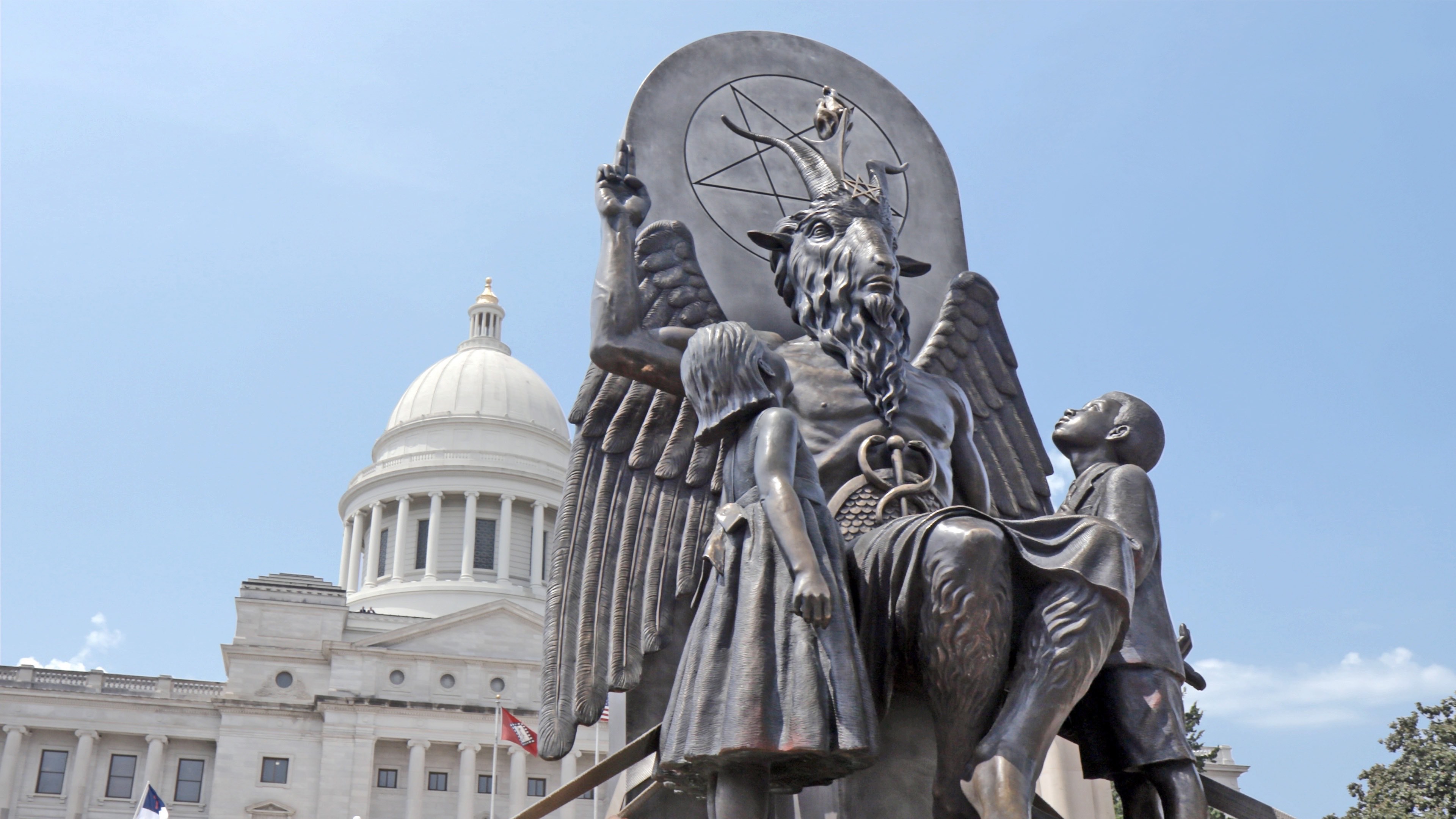A new documentary from director Penny Lane (yes, that is her real name) explores the rapid growth of a new religion that’s way less weird than it sounds. The six-year-old organization known as The Satanic Temple (or TST) began as a kind of performative joke; but at this point, they are deadly serious. Well, not deadly. Completely disparate from the ’80s “Satanists” of old (the U.S. media reported on a “Satanic Panic” during that time, amidst accusations of murder and child abuse), the Satanic Temple of 2019 lobbies for the separation of church and state. They are pro-choice, pro-LGBTQ rights, and believe in religious diversity and pluralism. They seek to promote social justice, empathy, and environmental respect. Their org is also non-violent; they even fired one of their own after she hinted at the execution of Trump within the context of a performance art piece.
In the biblical story of Adam and Eve, Satan assumes the form of a sly serpent in order to tempt Eve into eating forbidden fruit. Once she does, she gains access to Knowledge—hardly a bad thing, one might argue. While TST members do not literally believe in The Devil (they are only non-atheist in the sense that atheism has no code of conduct or community), they do support science, education, and the pursuit of enlightenment; as one member points out in the doc, the devil was a rather reasonable fellow in many a Christian tale. Satanists point to the glaring violence and injustice inherent in much of Christianity, as it stands: for example, God banishing Adam and Eve from the Garden of Eden for their curiosity, and subsequently punishing the rest of humanity for those crimes. Not cool, man.
TST headquarters (painted a dramatic black) can be found in Salem, Mass., home of the infamous witch trials; but the religion’s co-founder and lead spokesman Lucien Greaves attended the Sundance Film Festival this year in support of Lane’s documentary, where I caught up with him. Greaves has one scarred eyeball and a wry smile—sneaky, but not devious. He seems to emit a dry humor, despite choosing his words very carefully and maintaining an imperturbable air. We chatted about how the group selected Satan as their mascot, why his colleagues all wear so much black, and what their next big project is (don’t worry: it’s not a ritual sacrifice).

Lucien Greaves
A lot of people mistakenly believe your religion involves worshipping Satan. What is the reason you maintain the “Satanist” title, when you could easily go under a different moniker and eradicate the confusion?
We couldn’t easily go under another moniker. We couldn’t just decide to make up a mythological character who spoke to our values and embodied them… We grew up with Satan. Everybody has this understanding of what Satan is supposed to be, and even for atheists and non-believers, these symbolic norms have a certain power, the strength of metaphor and art. The raw material changed shape during the Enlightenment—when Milton wrote Paradise Lost, people were seeing a new face of Satan, as a rebel against tyranny. Christendom was starting to collapse, this stranglehold of the church over Western civilization. There was this idea of the embrace of knowledge—the adversary who had tempted Eve to eat from the tree, how that was denigrated by the church. And this came from the church: that we shouldn’t follow reason and science, but bend our knee to some divine authority, and the people who claim to have a direct line to it. So to us, this is an established backdrop for everything we’re doing. We really couldn’t call it anything else. That iconography resonates for us. We wouldn’t be at liberty to arbitrarily change it.
What is the difference between your religion and atheism?
It was summed up really well by our lawyer in the documentary: Atheism defines what you’re not. I object to any narrower definitions of atheism…it’s not appropriate to place political values onto it. It’s just a declaration of non-belief. And I think we should be happy if we see more conservative atheists…at least then, maybe we can talk about the facts. Empirical evidence. But when you are a Satanist, you’ve started to define what you do believe, what values and ethics you hold, and we’re held together as a community by our adherence to that.
When the doc depicts a Satanic after-school program for kids, you say something like, “I would’ve wanted to be in that club as a kid!” Were you raised with religion? What was your experience with it growing up?
Yes, to a certain point. My mom’s side of the family was Protestant, my dad’s was Catholic. I was exposed to both churches, but not aggressively—just enough to not like it at all. I was very much aware of what the churches were trying to tell me, in that they tackle large existential questions. When you’re a kid you take those things very seriously. The Satanic Panic hit when I was a kid too, and there were all these stories on daytime talk shows of Satanists doing horrible acts, and of course you take those at face value, too… later on, you find out, nothing of the type was happening. While at the same time, the churches were molesting children and covering it up.
“This came from the church: that we shouldn’t follow reason and science, but bend our knee to some divine authority, and the people who claim to have a direct line to it.”
You’ve said you didn’t want to be the face of this religion, you only wanted to be the voice—but you ended up being the face anyway. Why were you initially resistant?
I’d done a lot of research on the Satanic Panic, and felt I had a deep academic understanding of Satanism, how it happened and why. So I was keenly aware of how many lives had been ruined just by accusations of being Satanists—and the idea of coming out as a public Satanist seemed like something of a suicidal act. But what we were doing meant enough to me. And even if it weren’t controversial, my own enthusiasm for the camera just isn’t there. I feel like I’m well-received, but I didn’t expect that. I don’t feel like I’m photogenic. At the time, I did not have the confidence, but as we were developing this, the issues were too complicated to try to coach somebody else to be able to describe these things. I needed to be the person speaking live.
Often the best leaders are the people who don’t want to be leaders, because they don’t have the ego…
We have seen people just get ruined by a little bit of attention.
And power.
Yeah, they get in front of the camera, they do an interview one time or whatever, and kind of lose their minds…then they’re doing things just for that purpose. We get accused of that, and that is just not true! [Laughs]
You’ve kept the traditional aesthetic of Satanists of old, even though your values are completely different. The black clothes, the devil horns, carrying black umbrellas in the sun, sort of a goth/punk look. Is that deliberate, or is it just a coincidence that so many of you enjoy the style?
That’s just the aesthetic. To be fair, we’re seeing it change a little bit, or we’re seeing different aesthetics make their way into Satanic culture that were never there before. It’s encouraging to me, to see how many people don’t feel compelled to follow suit. One time I was speaking at a conference and an elderly Southern couple came up to me—they looked like they could’ve been Sunday School teachers—and enthusiastically showed me their Satanic Temple membership cards. That was amazing.
There are seven tenets of Satanism. Who came up with them, and how do they differ from or compare to the Bible’s Ten Commandments?
They’re meant to be general principles that people can live by—anybody—that will better their condition. They’re not just for a select group of elite individuals, or some kind of tribal dictum. The Ten Commandments, most of them, are about the one true God, and the proper way to worship him. That’s what makes it so offensive, the idea of having that monument [the Ten Commandments] on capitol grounds to the exclusion of any other religious viewpoints, and trying to say there was some kind of secular message behind it that everybody can agree to—obviously not! But the seven tenets were something that Malcolm [Jarry], who co-founded The Satanic Temple with me, and I deliberated on for some time. They are deliberately open to interpretation: If you generally follow them in principle, you’re OK, but they don’t micromanage and tell people how to live. We haven’t gone further than that in trying to define our beliefs for people, like giving them a dress code or saying that they must engage in a certain ritual practice. That would be against our anti-authority philosophy. And our rituals are very much in-the-moment and malleable to different circumstances.
Many TST members seem to have pseudonyms; Lucien Greaves is also not your real name. Is that for safety reasons?
Yeah, a lot of people are worried that publicly being a Satanist will hurt their careers or standing in their community. We do get a lot of threats. And people ask “are they credible threats?” Well, you don’t know until somebody comes at you. So, I don’t begrudge anybody having a pseudonym. I am mystified though, at how many times people have called me a fraud because I have a pseudonym. People use them all the time—just because an author writes a book under a pen name, it doesn’t mean he’s not an author.
How many members of TST are there worldwide?
About one hundred thousand now. I think that’s a number where people are going to have to start accounting for Satanists. At the beginning, we felt like we were speaking for a population that wasn’t speaking up. And that population rose to the challenge; more and more people are beginning to see this for what it is, and are willing to stand with us.
“You can’t just say you’re disgruntled about a general topic and expect anything to happen. If TST really gets serious about lobbying, we’ll be one of the few going that route.”
What is the group’s next big project going forward into the new year?
I’m working hard on getting together a lobbying branch of The Satanic Temple, where we’re going to write model legislation and do activism as it’s supposed to be done. In the United States, people have lost a sense of the difference between protest and activism, to the point where they feel their protests are enough. We do the Women’s March or the March for Science, people stand outside with signs for a day. But this administration doesn’t give a shit. They weren’t making any specific demands—everybody goes home and feels like they did their part, made an effort, and hopefully somebody will change things down the line. To me, that’s a bunch of squandered energy that could be used to petition for tangible change. I felt that was a real failing of the Science March: that they didn’t ask for some environmental policies or have any real demands. You can’t just say you’re disgruntled about a general topic and expect anything to happen. If TST really gets serious about lobbying, we’ll be one of the few going that route.
Someone in the doc says you are not anti-Christian, but rather post-Christian. Could you explain that?
Our Christian past colors our religious perspective—we’re using this Christian iconography, and it still means something to us, even if we don’t believe it literally. Even though we do things with a mind toward the rejection of the organized religious structures we grew up with, it’s not that we’re a protest movement—we are motivated by our own affirmative values. We’re more concerned with that than with renouncing what other people are doing. We’re focused on what we can change to better the human condition. FL







